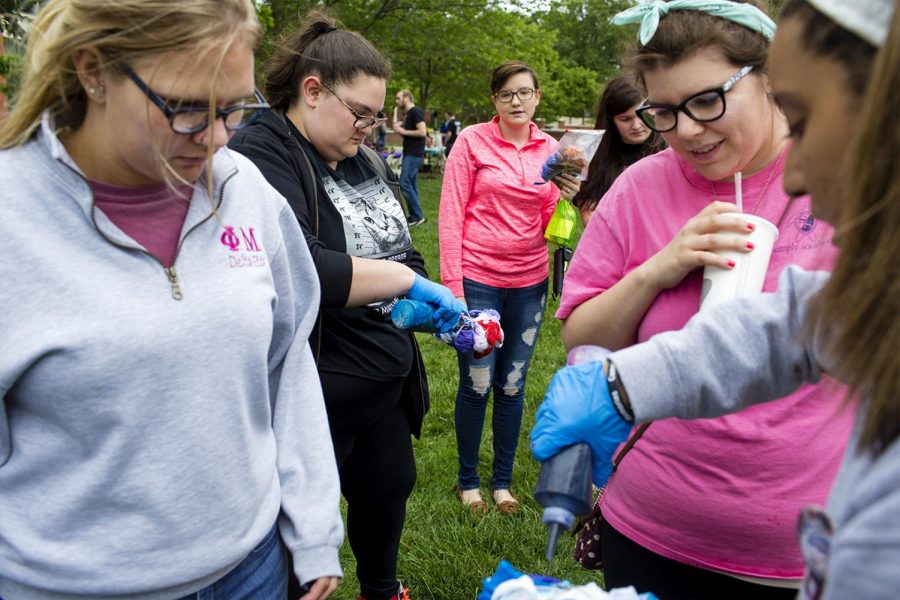Event raises awareness for mental health issues
May 3, 2017
On a windy day at WKU, Housing and Residence Life (HRL) hosted an event that consisted of tables set up with mental health resources, “Hope Floats” made of ice cream and soda and t-shirts for students to tie-dye.
Hope on the Hill took place on Monday from 11 a.m. to 1 p.m. At Hope on the Hill, mental health resources included brochures on topics like depression, anxiety and procrastination. Posters set up at different tables included information on the difference between stress and anxiety, the effects of addiction to alcohol and smoking on the body and other topics.
Students received handouts so they could fill out a self-care plan for themselves. One table offered free buttons and “Hope Bags” filled with goodies. After students circled the Downing Student Union courtyard and went to the different tables, they got free t-shirts to tie-dye.
Blair Jensen, assistant director for HRL, chaired a planning committee to put the event together. The committee brainstormed ideas and discussed what they wanted students to gain from the event. From there, they formed an idea for Hope on the Hill. Jensen said the committee wanted to raise awareness of campus resources and mental health issues and help “shatter the stigma” through Hope on the Hill.
“I hope that it will increase students’ awareness of campus resources,” she said. “I hope that it will increase their ability to recognize signs and symptoms in themselves and others and then make referrals to those various campus resources, and I think kind of a more abstract thing is that we’re hoping to kind of shatter some of the stigma tied to mental illness and create a space where students can talk about it openly.”
Jensen said she feels as though a negative stigma is still associated with mental health issues; feelings surrounding mental health issues are becoming more positive.
“I think that, depending on where people are coming from, that perhaps their families have a negative perspective on therapy or counseling see it as a sign of weakness, and sometimes those feelings get perpetuated, so I think that there can be a negative stigma, but I do feel like it’s definitely becoming more positive, that people are becoming more open and more willing to talk about things, and that’s a good thing,” Jensen said.
Kellsei Tate, assistant hall director for Minton Hall, said she had personal experience with the effects of the negative stigma associated with mental health issues.
“I just feel that throughout my life, I’ve been in contact with individuals who have struggled with their mental health, and they’ve suffered in silence, and it’s led to suicide for quite a few family members, so for me it’s something very personal and I feel like it’s something that needs to be talked about because the more you talk about something, the less it can affect you in a negative way,” she said.
Tate said she feels struggling is part of life and she wants to spread the attitude, “it’s okay to not be okay.”
She said if people listen with the negative stigma associated to mental health issues, they feel they can’t talk about anything and “they just fall farther and farther into a dark place, and it just doesn’t lead anywhere healthy.”
“It could lead to unhealthy coping strategies and essentially it could lead to suicide, so we’re trying to get people away from that,” she said.
Tate said she hopes Hope on the Hill creates a conversation about mental health issues.
“I hope it helps start a conversation,” she said. “A lot of times, these topics are harder to talk about, so people feel obligated to stay silent, so I’m just hoping it starts a conversation about how to tell signs in friends and how to seek help if needed.”
Dan Rosner, a coordinator for HRL, said he feels there is a lack of understanding of mental health issues.
“I think that there are some people that don’t necessarily understand what it’s like for anybody, whether they’re a student or anybody else that’s experiencing these [issues],” he said. “It’s very hard to grasp what it’s like to be working through some of these challenges, so I think that there’s a huge lack of understanding, and I think for students that are personally experiencing it, sometimes it can be embarrassment or shame or any of those types of feelings, or even sometimes helplessness of ‘how do I overcome this?’”
Rosner said he believes mental health needs to be addressed.
“I think that mental health as much as physical health and those types of things – they all need to be taken care of,” he said.
Reporter Olivia Mohr can be reached at 270-745-6288 and [email protected].



















![Megan Inman of Tennessee cries after embracing Drag performer and transgender advocate Jasmine St. James at the 9th Annual WKU Housing and Residence Life Drag Show at Knicely Conference Center on April 4, 2024. “[The community] was so warm and welcoming when I came out, if it wasn’t for the queens I wouldn’t be here,” Inman said.](https://wkuherald.com/wp-content/uploads/2024/04/smith_von_drag_3-600x419.jpg)


